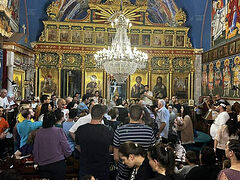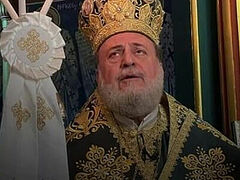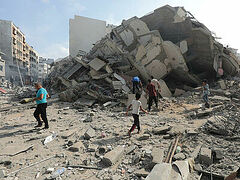Members of the Russian Ecclesiastical Mission in Jerusalem of the Russian Orthodox Church Outside of Russia (ROCOR) now almost live in the state of war that Israel and Hamas are waging against each other in the Gaza Strip. While there are no Russian convents or churches in the conflict zone, the tragedy is almost knocking their door. How the mission lives in these circumstances, what people are feeling there, and how to survive when air raid sirens sound several times a day and pilgrims cannot fly to the Holy Land to venerate the sacred places and support the monasteries and churches financially—this was the subject of my talk with the head of the mission, Archimandrite Roman (Krassovsky).
 Archimandrite Roman (Krassovsky)
Archimandrite Roman (Krassovsky)
—Father Roman, my first and most important question is about the safety of the mission members and parishioners. Are people safe in the current conditions? And what about the safety of our sacred sites in the Holy Land?
—Thanks be to God, as far as the mission is concerned, we are all safe. Our places are pretty much safe as well. We do not have any lands near Gaza, where the unfortunate battles are happening right now.
As far as our convents are concerned, it is mainly safe, though here at the Mount of Olives convent where I live, we have some uprisings outside the walls, and there are riots, which are put down by the Israeli police. That is happening because we live in an Arab Palestinian area.
—I am correct that right now, everything is calm near the convent?
—Pretty much, yes. Sometimes, when there are problems outside the gates, we have tear gas or something else coming over the walls. We already know this happens often enough, so we just go to our rooms.
Otherwise, everything is fine, though people are pretty much staying in their convents—here, or in St. Mary Magdaline convent in Gethsemane, or in Bethany and the Bethany school for girls. That is pretty safe. However, if somebody goes into the Old City of Jerusalem they go in twos or threes together—going alone could be problematic because the Israelis are very tense right now, and it could cause issues.
—What do people feel and think in these dire circumstances?
—Unfortunately, of course this was bound to happen, it is not unexpected. We have seen the problems between the Israelis and Hamas; this concerns many of our sisters, who are Palestinians. But just as they did during Intifada, or the Six-day war, they pray and hope that things will soon stop.
—Could you please describe in general what is happening now inside and outside the mission? How does the situation affect its everyday life?
—What affects us most is that there are no pilgrims. This flow completely stopped at the beginning of October when the situation began evolving. I would say that our main obedience is to take care of those people, but now we have absolutely none of them. Of course, that concerns us financially. Now we have no income; most of our income is from our pilgrims and people who kindly donate.
—Does this mean that the mission is already having significant financial problems?
—Yes, because we still haven’t recovered from the COVID-19 situation when, again, there were no pilgrims for two years. Only recently have pilgrimages returned on a regular basis. But of course, there were very few pilgrims from Russia because of the situation in Ukraine [and the sanctions against Russia]. Prices for flights are very, very high, and people cannot afford to come.
—Do you need financial support right now?
—Yes, very much. If people would be kind enough to donate to us—they can just go to the ROCOR Synod of Bishops website, there is a square there that says, “For the Russian Ecclesiastical mission.”
—We spoke with you just a couple of weeks ago when you were in the US, and you were sure at the time that everything is more or less calm around the mission. However, several days after that, you urgently changed your plans and returned to Jerusalem. And it took you five days to reach Israel. Does this mean that not everything is so good as you thought while in the US?
—When I was in the US, and these events started happening, I had already made my mind up to return to the mission, though the mission itself was not in direct danger. But I understand that I should be here as a head of the mission. If nothing else, just so that the monastics, the nuns and brothers, feel that the head of the mission is there with them.
—You have already mentioned the school for Palestinian girls in Bethany. How are they living now, what is the situation there, and what help do they need?
—We have a school of 375 girls, the majority of whom are Muslims. Mother Maria, who is the elder sister at the convent there—the convent of the Resurrection of the Lord—takes care of them. But she also was caught in the US in the beginning of these events. Thank God she, like me, returned to Israel.
It is a matter of just keeping everybody calm. Of course, passions are very strong, and people are very emotional about this situation. It is not a matter of the sisters, but in the school we have to keep children calm and keep their minds on education and not on the political situation.
 Convent of the Ascension of the Lord on the Mt of Olives.
Convent of the Ascension of the Lord on the Mt of Olives.
—Several days ago, you appealed to the people in ROCOR with very, I would say, emotional letter asking for support. What was the outcome?
—Thank God, people are responding. Many of them, particularly those who have visited the Holy Land in the past, take everything that happens here somehow closer to their hearts. They were here, they prayed here not only at the Holy Sepulcher and other sacred sites, but in our convents as well. They know how people live here, and they help. We thank Lord for that.
As I already said, since the pandemic and because of the situation in Ukraine, we have had some problems with funding. And things will more difficult now. Thank God, the convents and the mission continue to live, but we have financial obligations that we have to keep.
—What do you think we should learn from this situation?
—This situation should lead us to repentance. God is showing us what is happening in the world: illnesses, conflicts, fratricidal war in Ukraine, war in the Holy Land—people are suffering. That says that we have to focus on our spiritual life and confess our personal sins. This is the only way to our salvation, through the prayer and confession. And we find it in in the Church of Christ.




